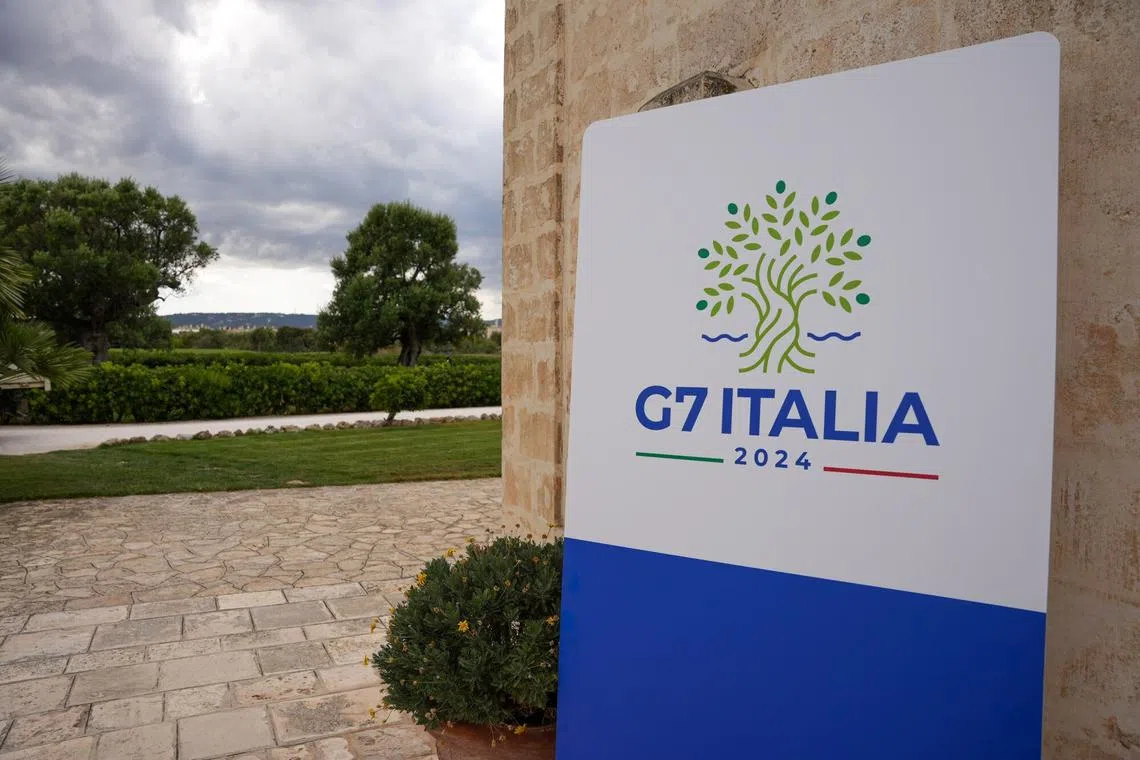G-7 hammers China over Russia ties, ‘harmful’ trade
Sign up now: Get ST's newsletters delivered to your inbox

China has been a key focus of the G-7 talks in Italy.
PHOTO: BLOOMBERG
BARI, Italy - Group of Seven (G-7) leaders meeting in Italy on June 14 hardened their tone against China, warning Beijing to stop sending weapons components to Russia and to play by the rules on trade, according to a draft summit statement.
China has been a key focus of the G-7 talks in Puglia, amid souring trade relations between Beijing and the West and concerns that its supplies of equipment to Moscow are fuelling Russia’s war in Ukraine.
“We call on China to cease the transfer of dual-use materials, including weapons components and equipment, that are inputs for Russia’s defence sector,” according to a draft statement seen by AFP.
The G-7 also took aim at what it called “dangerous” incursions by China in the contested South China Sea, where worries of a military escalation between Beijing and its neighbours are rising.
“We oppose China’s militarisation, and coercive and intimidation activities in the South China Sea,” the statement read, using stronger language than at last year’s summit in Japan.
After a first day dominated by Ukraine, US President Joe Biden and the leaders of Japan, France, Germany, Canada, Britain and host country Italy turned their focus to the world’s second-largest economy, a superpower whose oversized influence on geopolitics and global trade cannot be underestimated.
“G-7 countries are on the same page vis-a-vis China,” a Japanese government source told AFP.
Talks on June 13, attended by Ukrainian President Volodymr Zelensky, were marked by a strong show of G-7 support for Kyiv, with an agreement to use profits from frozen Russian assets to provide a new US$50 billion (S$67.7 billion) loan to Ukraine.
With the war in its third year, the G-7 statement said the deal sent an “unmistakeable signal” to Russian President Vladimir Putin that they would back Kyiv for “as long as it takes”.
But there were also tensions over whether abortion should feature in the final statement, with its explicit mention left out of the draft viewed by AFP on June 14.
Deteriorating global trade relations have been a backdrop to the summit, however, exemplified by the European Union’s announcement this week of plans to impose new tariffs on Chinese electric vehicles.
Beijing denounced what it called “naked protectionist behaviour” and said it reserved the right to file a suit with the World Trade Organisation.
The US, Japan and the EU, which attends G-7 summits as an unofficial eighth partner, have all voiced concern over China’s so-called “industrial overcapacity”.
They say generous subsidies by Beijing, particularly in green energy and technology sectors such as solar panels and electric vehicles, result in unfairly cheap goods flooding the global market.
That excess capacity threatens Western companies struggling to compete, particularly in the growing green tech sector.
“We express our concerns about China’s persistent industrial targeting and comprehensive non-market policies,” the G-7 summit draft said. It warned against “practices that are leading to global spillovers, market distortions and harmful overcapacity in a growing range of sectors”.
China has dismissed the concerns but Washington had pressed for a united G-7 front.
The leaders also called on China to stop restricting its exports of critical minerals used in key global industries such as telecommunications and electric vehicles.
Security and defence concerns were front and centre on June 14, particularly accusations that Beijing has helped expand Russia’s armed forces.
Washington has accused Beijing of helping Russia’s defence industry – and therefore its invasion of Ukraine – through joint production of drones and exports of machine tools needed for ballistic missiles.
The G-7 also warned “financial institutions to refrain from supporting and profiting from Russia’s war machine”, saying it would take “further steps to deter and disrupt this behaviour”.
A senior Biden administration official told journalists that the items supplied to Russia not only harm Ukraine but also pose a long-term threat to the security of Europe.
At a joint press conference with Mr Biden, Mr Zelensky said he had spoken by phone to Chinese President Xi Jinping, who “gave me his word” that he would not sell weapons to Russia.
“We will see,” Mr Zelensky added.
The G-7 said it was “seriously concerned” about wider security in the Asia-Pacific, where China’s confrontational tactics and militarisation of islands in the South China Sea – and its recent war games around self-ruled Taiwan – have increased fears of a potential conflict.
“We express serious concern about the increasing use of dangerous manoeuvres and water cannon against Philippine vessels,” read the draft.
The Japanese government source said it was crucial for the leaders in Puglia to send a clear message to Mr Xi that the issue was not merely regional, but also of concern to all the G-7 nations. “All the (G-7) countries are aware that we need to convey the message very candidly to the Chinese at the very top level,” the source said. AFP


